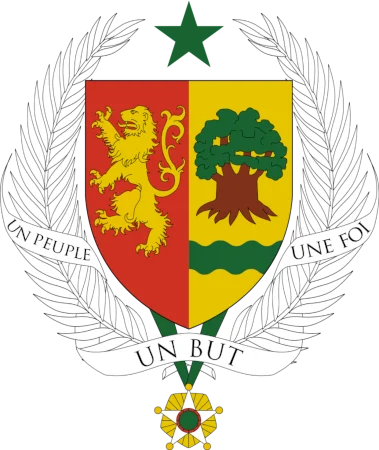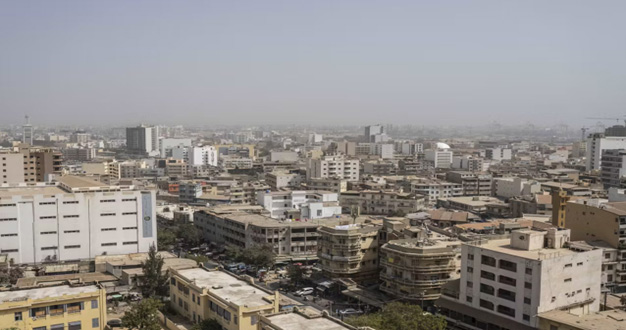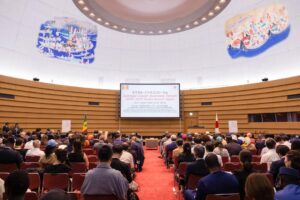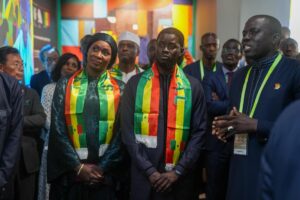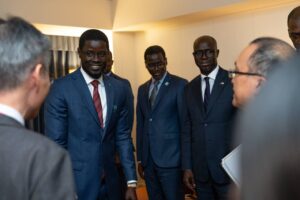A moins de deux mois de la TICAD 9, l’Ambassadeur Jean Antoine DIOUF a accordé une interview au quotidien NIKKEI sur les attentes de l’Afrique vis-à-vis de la TICAD 9, les secteurs prioritaires ainsi que les opportunités d’investissement pour l’Afrique et le Sénégal.
Il a, en outre, livré son opinion sur la mobilité professionnelle entre le Japon et le Sénégal, dans un contexte où l’Archipel nippon connait une baisse de main d’œuvre consécutive à la récente décroissance démographique.
—- Lire l’intégralité de l’interview en anglais —–
-
What kind of outcome can you expect in the TICAD 9?
The world is currently facing daunting challenges ranging from inter-states wars which threaten commodities supply chains, internal political unrests, geopolitical tensions, global warming, food insecurity, migration, pandemics, humanitarian crises and their consequences.
As an international Community, it seems that we are unable to speak in one voice in order to squarely address those challenges including some threats that could jeopardize the future of humankind. Multilateralism is challenged as well as the rules-based international world order.
As a continent of young States and several fragile economies, Africa takes a heavy toll on this current situation which compromise its developing efforts.
We therefore expect TICAD 9 to stand out as a platform which will foster political dialogue and international cooperation to drive sustainable development and economic growth in Africa. Japan was the first global power to enact a strategic partnership with the African Continent in 1993 when Africa was undergoing severe disruptions caused by civil wars, military coups and epidemics.
Japan is also one of the major actors in the continent in terms of Official Development Assistance, including through impactful projects on health, education, agriculture, water and sanitation, energy etc. Yet, the volume of Japanese private investments is still low compared to the huge financial capacities and extraordinary expertise of Japanese companies. I believe that this can and should be further promoted at TICAD 9.
2- What kind of investment do you expect from Japan?Japanese innovation expertise is second to none in the field of digital technology, including Artificial Intelligence. Investing in digital technology could further accelerate Africa’s transformation. This could have a ripple effect on strategic sectors such as health, education and human development, agriculture, manufacturing and as a matter of consequence on job creation. For, giving job opportunities to young African is of paramount importance in a continent which has the youngest population in the world and where 60% of the population are aged below 25.
This requires steady investments in the energy sector as more than 600 million Africans do not have access to electricity. Furthermore, the high cost of energy combined with its erratic provision seriously affects production capacities. Therefore, we need massive investment in the energy sector including renewable energies.
Furthermore, investing in infrastructure in order to scale up connectivity in Africa is vital as the continent has engaged in the African Continental Free Trade agreement which is one of its flagship programs under the African Union Agenda 2063. With an integrated market of 1,4 billion consumers and 3.4 trillion USD, this program will boost intra-African trade and transform Africa thanks to a larger and inclusive connectivity network.
However, the key to a successful and lasting move is prioritization and co-creation. African countries and leaders should take ownership of the continent’s development of course with the support of friends and partners like Japan in a win-win approach.
3-Do you think that Japan should invite young workers from your country, including skilled workers?Professional mobility is social fact nowadays. Each individual has the right to seek the betterment of their living conditions and personal fulfilment. Equally all states try their best to draw the highly qualified professionals as well as workers in specific areas of need to run their economy. From that standpoint, I can but support such an initiative provided that it benefits Japan as a country and young Senegalese workers without being detrimental to my country in terms of brain drain.
There could be a mechanism through which workers are enabled and empowered to give back to their mother country which trained them and carried them until they became skillful workers.
Besides, both countries need to facilitate those young workers’ investment projects in Senegal (be it private or business) but also anticipate their retirement in terms of pension payments.
Indeed, individuals as well as both countries should benefit from professional mobility specially as Japan’s population is aging while Senegal has a large, young, accessible and skilled workforce. However, a concerted approach is needed between the two states. By the way, I would be remiss not to acknowledge Japan’s outstanding support to Africa through programs such as ABE initiative which gives young Africans unique opportunities to hone their knowledge in top Japanese universities and companies.
4-How do you see investment opportunities from Japan and rest of the world into your country?
Senegal is a politically stable country and is viewed as the « Beacon of democracy » in West-Africa and beyond. The peaceful transition of power in March 2024 which led to power the youngest-elected president in Africa confirmed Senegal’s democratic track-record.
Thanks to a long-term Vision with “Senegal 2050” development plan and its strategic geographic location which places it at crossroads between America, Europe and the rest of Africa, Senegal has a promising economic outlook. A friendly business environment in addition to oil and gas production will drive socioeconomic growth and attract more investment in the Vision 2050’s flagship projects in energy, infrastructure, industrialization, agriculture, digital transformation, and more.
As for now, Senegal’s economic attractivity and political stability has favored the presence of several companies from Middle-East, America, Europe and Asia, including Japanese multinationals and start-ups.
I would like to seize that opportunity to invite the Japanese private sector to visit Senegal’s Pavilion at Expo Kansai 2025 and participate in the Business Forum on 25 August 2025 where they will have extensive information on investment opportunities in my country.
—- Lire l’intégralité de l’interview en japonais—–
